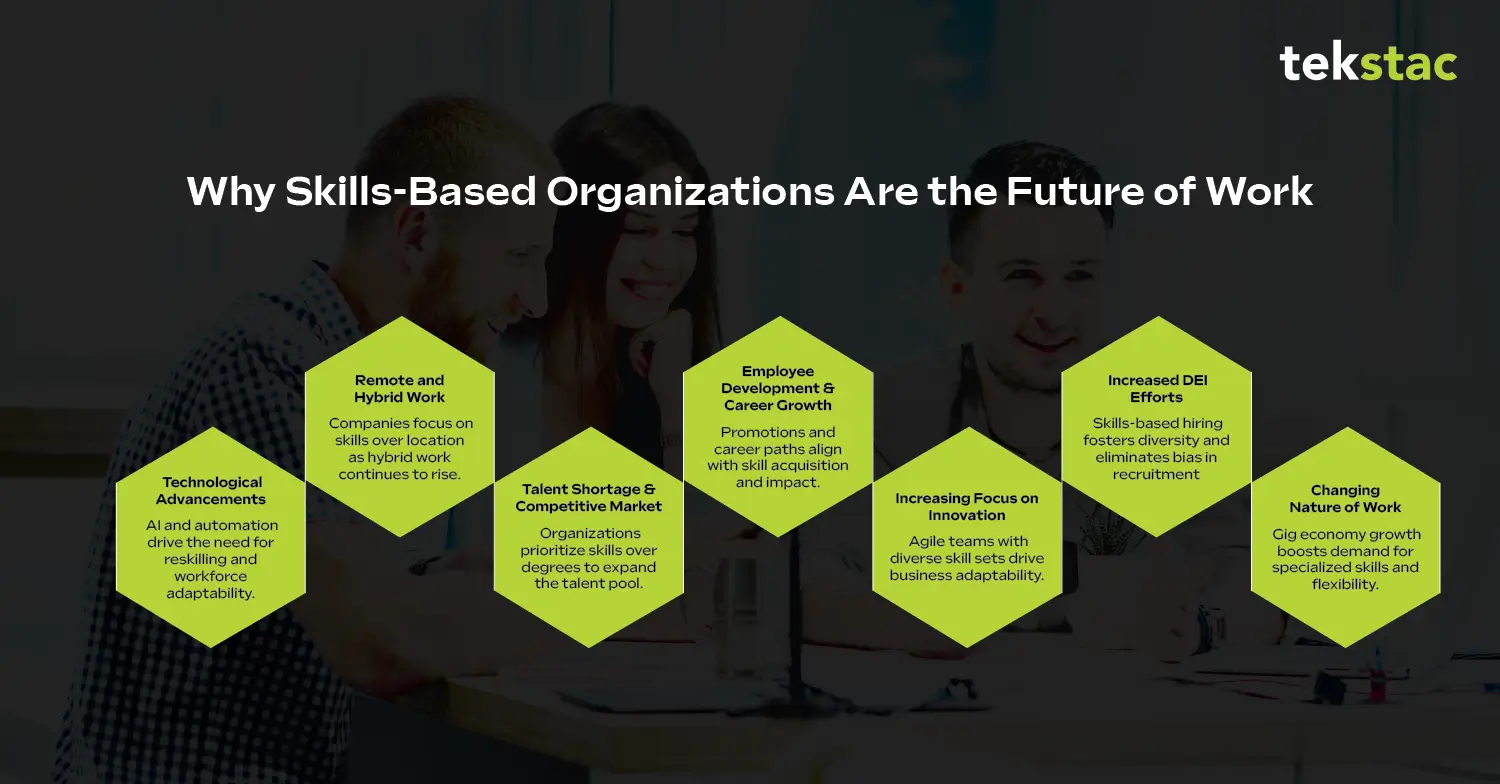Why Skills-Based Organizations Will Dominate 2025 and Beyond

When hiring, retaining, and managing top talent, the bar is being raised higher for organizations.
As of January 2024, 52% of US job postings on Indeed omitted formal education requirements entirely. Employers have shifted from degree-based requirements to skills-first hiring practices, which is only the first step.
This is a part of turning into a skills-based organization, where employers move away from traditional job titles and rigid roles. Instead, they focus on the actual skills employees bring to the table.
With the new technology tools sprouting and the increasing nature of remote work, businesses focus on people who could immediately add value with applicable, practical skills, aside from background or previous experiences.
To find and retain such talent, organizations must transform into skills-first organizations poised to dominate in 2025 and beyond.
What Are Skills-Based Organizations?
A skills-based organization is one that prioritizes the skills employees possess over traditional job titles or fixed roles. It structures teams and projects around the competencies required to drive business results. This allows employees to contribute based on their strengths and expertise.
Beyond hiring, a skills-based organization focuses on career development, promotions, or project management. Employees are assessed and advanced based on their skills and contributions rather than seniority.
For example, consider a company with defined roles, such as “Marketing Manager” or “Sales Representative.” Promotions are based on seniority, and employees are expected to stay in their roles for many years before moving up the ladder. For instance, a Marketing Associate role can only get promoted to Marketing Manager if the person has worked at the company for at least 5 years, regardless of whether they have mastered new marketing techniques or additional skills.
In contrast, a skills-based organization would recognize the value of new skills over years of experience or education. If the person possesses the right skills and knowledge, they would be promoted to leadership after demonstrating results with their abilities.
Why Skills-Based Organizations Are the Future of Work
The transition to a skills-based model is a foundational shift that aligns with the evolving future of work, where agility, adaptability, and innovation drive success. Organizations must rethink traditional approaches to hiring, training, and talent development to stay competitive.
Becoming a skills-based organization requires businesses to adopt a mindset emphasizing the importance of employees’ abilities and talents rather than background or experience. This helps focus on continuous learning and skill development to build high-performing teams.
Here are the top 7 factors that will drive organizations to turn into skills-based organizations in 2025:
- Technological advancements
- Remote and hybrid work
- Talent shortage and competitive labor market
- Emphasis on employee development and career growth
- Increasing focus on innovation
- Increased DEI efforts
- Changing nature of work

1. Technological advancements
Technology is rapidly changing industries, with businesses integrating automation, AI, and other digital tools into their operations. An IBM report found that India will be the biggest adopter of AI in 2024, with 59% of large IT organizations deploying AI and 27% exploring this technology. 74% of this group is actively using AI in the following areas:
- 67% for research and development
- 55% for reskilling and workforce development
- 53% for building proprietary AI solutions
With AI handling repetitive tasks, humans are needed for creativity and problem-solving. This has shifted the focus to specific skills employees need to work alongside these emerging technologies. Also, organizations increasingly use these technologies for reskilling and development, ensuring the workforce has the required skills and is ready for the tech-driven future.
AI is also being embedded into employee training programs, helping tailor learning experiences and provide real-time feedback, thereby accelerating the learning curve for both new hires and existing talent.
2. Remote and hybrid work
Since the pandemic, most organizations have shifted to remote work. However, at the end of 2024, remote and hybrid work is still on the rise and will continue in 2025. A report by JLL revealed that 90% of Indian organizations require employees to be present in the office 3 days a week, surpassing 85% of the global average. LinkedIn’s report on Global State of Remote and Hybrid Work shows a 4.6% increase in hybrid roles in India in 2024.
As people work from different locations, companies focus on the specific skills employees bring to the table, regardless of where they are.
3. Talent shortage and competitive labor market
As per a Manpower report, nearly 4 in 5 employers in India found difficulty in finding the right talent in 2024. As observed, a growing demand for skilled workers makes recruitment highly competitive. To attract and retain talent, organizations must drop formal educational requirements and leave behind factors like location, background, race, and so on to hire talent that aligns with organizational needs. This mindset will help tap into a broader talent pool and retain skilled employees.
4. Emphasis on employee development and career growth
A skills-based approach also promotes talent mobility by allowing employees to move laterally across departments or take on cross-functional roles based on their skills, not just tenure. This increases engagement and retention while unlocking hidden potential within the workforce.
With 55% implementing new technologies to reskill and support workforce development, the emphasis is moving away from career growth based on skills employees acquire and their ability to drive value. This means promotions, appraisals, and career paths will be tailored to individual skill sets and their impact on the organization.
5. Increasing focus on innovation
With the changing nature of work, companies now require teams that can adapt quickly to new needs. The need for agility and innovation has grown in response to market disruptions, such as global pandemics, economic shifts, and technological advancements. To quickly innovate, organizations must create flexible teams of employees with diverse and evolving skill sets to adapt to this fast environment.
6. Increased DEI efforts
HBR found that in 2024, organizations’ overall Diversity, Equity, and Inclusion (DEI) efforts had increased when compared to the previous year. A high 60% of organizations had a DEI strategy in 2024. Focusing on skills rather than background allows companies to improve and broaden their hiring criteria, removing biases related to educational background, race, or gender. This approach ensures that candidates are hired and promoted based on their abilities and potential.
7. Changing nature of work
During the festive season, India witnessed a 23% increase in gig employment opportunities compared to 2023. With work changing, more project-based, freelance, or contract roles will require specialized skills. With talent shortages and competition, companies may shift to gig employment to leverage talent for specific skills. This also allows for more flexible work arrangements and quicker scaling of specialized teams.
Adopting a Skills-Based Culture in 2025
As businesses continue to transform at a higher pace, adopting a skills-based culture is emerging as an essential factor for organizational adaptability and innovation in 2025 and beyond. This forward-thinking approach will allow companies to prioritize employee capabilities, even in the face of technological disruptions and workforce expectations.
Traditional models that still rely on rigid hierarchies, predefined job titles, and tenure-based career paths will continue to witness challenges in DEI, utilization of talent, work-life balance, skill development, and career growth.
Organizations must implement efficient systems to evaluate and track skills effectively to adopt and maintain a skills-based culture. This requires skills-based assessments that focus on:
- Capabilities and the potential to grow and adapt
- Dashboards, real-time analytics, and data-driven insights
- Targeting tracking to keep a pulse on skills progression, strengths, and development plans
To support this shift, organizations must refine their L&D strategy, making it more agile, data-driven, and aligned with evolving business needs.
Transform Learning into Business Impact
This is where Tekstac can step in for organizations, whether pre-hiring assessments, reskilling, upskilling, or career development for IT professionals. It offers a comprehensive curriculum that can be fully personalized to meet organizational needs, ensuring employees acquire the skills necessary to succeed. Its solutions go beyond theoretical training by providing the following:
- 300+ learning paths to choose from, including data analytics, cloud, etc.
- Customizable assessments for specific skill requirements
- Practice labs and exercises with real-world simulations and hands-on training
- Data-driven insights on individual progress to monitor learning outcomes
These tools integrate seamlessly into existing L&D strategies, transforming how employees learn and grow.





